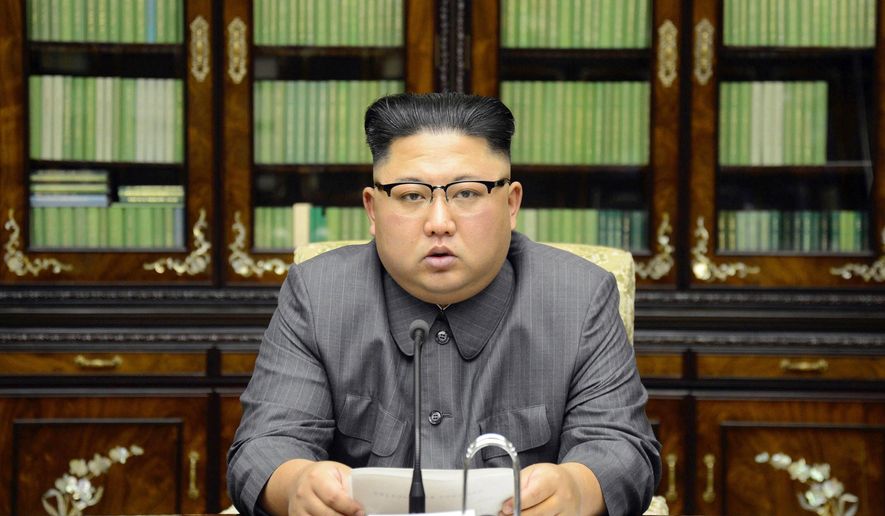A top CIA official called North Korean dictator Kim Jong-un a “very rational actor” who doesn’t want a war with the United States, despite a string of provocations that has sent tensions soaring across East Asia.
“The last person who wants conflict on the [Korean peninsula] is Kim Jong-un,” Yong Suk Lee, the deputy assistant director of the CIA’s newly created Korea Mission Center, told a Washington audience Wednesday.
In rare public remarks that appeared to contrast President Trump’s assertion that Mr. Kim is a “madman,” Mr. Lee said the 35-year-old dictator actually “wants what all authoritarian rulers want … to rule for a very long time and die peacefully in his own bed.”
“We have a tendency in this country and everywhere else to kind of underestimate the conservatism that runs in these authoritarian regimes, and it’s probably the greatest circuit-breaker in any kind of conflict,” he said, adding that, all “bluster and rhetoric aside,” Mr. Kim has “no interest in going toe to toe” with the U.S. military and its allies.
Mr. Trump and Mr. Kim has traded increasingly angry insults as tougher U.S.-backed sanctions and military moves have failed to stop Pyongyang from conducting test of nuclear weapons and the ballistic missiles that could deliver them to the U.S. mainland. Mr. Trump has repeatedly derided the young North Korean leader as “Rocket Man” who is risking the annihilation of his own nation with his policies.
But the CIA’s Mr. Lee, speaking at he CIA Ethos & Profession of Intelligence conference, an annual event at George Washington University, said that Mr. Kim’s “long-term goal” is “to come to some kind of big-power agreement with the United States and remove U.S. forces from the peninsula.”
CIA Deputy Assistant Director for East Asia Michael Collins and Ambassador Joseph DeTrani, the former U.S. special envoy to talks on North Korea, agree with Mr. Lee that Pyongyang’s goal is not to launch such a missile at the U.S., but to achieve legitimacy and broader freedom of action on the Korean peninsula, where U.S. troops have been positioned in South Korea since the early 1950s.
The North Koreans “see the U.S. objective in the region as regime change [in Pyongyang], and they’re talking about survival,” said Mr. DeTrani. “They want to survive, and they feel with these nuclear weapons no one’s going to mess with them.”
“Are they going to use [the weapons]?” he said. “No, they’re not suicidal.”
Mr. Collins said the North Korea crisis also is part of a larger strategic challenge for Washington — “the management of China’s rise in Asia.”
Beijing is Pyongyang’s main ally and trading partner, and the Trump administration — as the Obama administration did before — is pushing for China to play a more active role in containing the Kim regime.
Beijing has recently said it will enforce U.S.-backed sanctions. But Mr. Collins said “there is more China could do.”
“China still accounts for 90 percent of North Korean trade. China still provides the lifeline crude oil to North Korea,” he said. While Beijing is enforcing some sanctions, the Chinese remain “very sensitive to what they don’t put on the sanctions list.”
Mr. Lee offered a sharper take, asserting that China’s “main strategic goal is not to bring peace and stability on the Korean peninsula,” but to “frustrate the U.S. and maintain a permanent division of the Korean peninsula.” Beijing holds the “cynical view,” he said, of wanting to maintain a buffer zone between U.S.-aligned South Korea and the Chinese border to the north of North Korea.
“The only way they’re going to express or put pressure on North Korea is if they’re convinced of the seriousness of the U.S. purpose,” said Mr. Lee. China’s support for North Korea is actually creating “more threats to stability in East Asia” than would be the case if Beijing moved to further isolate Pyongyang, added Mr. Collins. “My hope is analysts and intelligence officers in China are wrestling with this equation and trying to do that cost-benefit analysis.”
• Guy Taylor can be reached at gtaylor@washingtontimes.com.




Please read our comment policy before commenting.